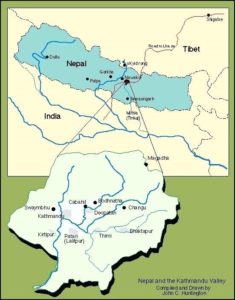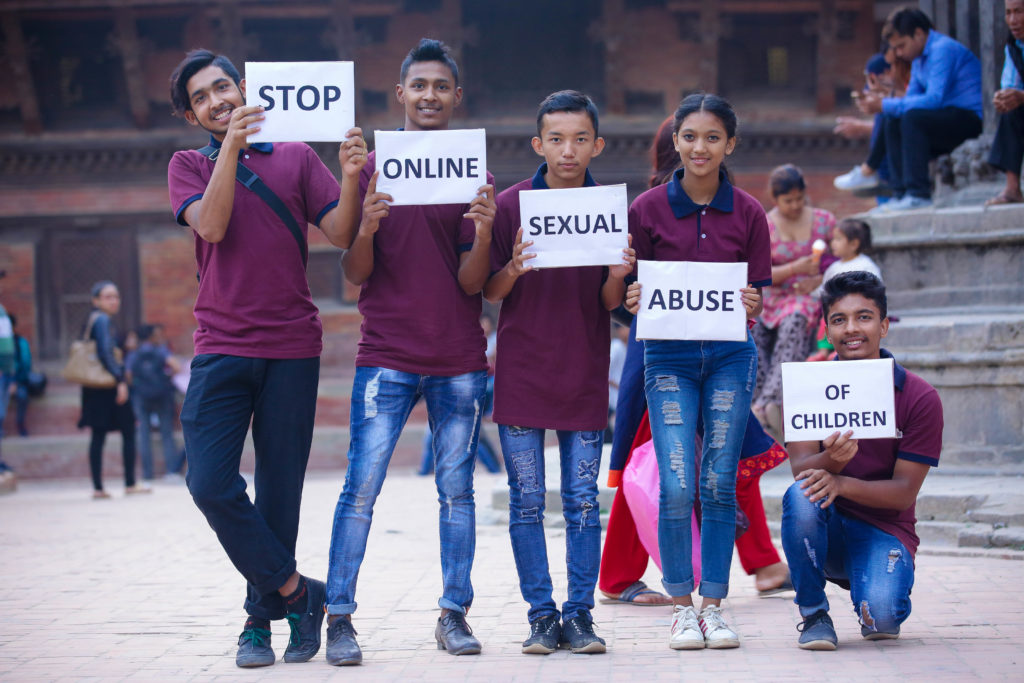Nos projets
NOS PROJETS EN COURS
Nepal:
Preventing and Protecting Children against Online Sexual Abuse in Nepal
Project Area
Kathmandu Valley

Project Period
Jan 2017 – July 2019
Context
Online sexual exploitation of children is the new frontier of sexual exploitation of children in Nepal. The vulnerability of children to sexual abuse and exploitation online is amplified today by the ultra-rapid expansion and easy accessibility of Internet as well as third and fourth generation mobile telephones. Yet many children and adolescents are unaware of risks. Findings from the Knowledge, Attitude and Practice (KAP) survey conducted by ECPAT Luxembourg’s implementing partner among 452 children in Kathmandu valley highlighted that two thirds (75%) of children did not have information to protect themselves from possible online sexual exploitation. Also, an overwhelming majority (72%) of respondents did not have information on steps they could take nor the availability of possible services should they be victims of sexually abusive encounters online. Importantly, around 15% of children admitted in the survey that they were abused online. [1] However, Nepal’s laws have yet to meet internationally recognized standards for combating sexual exploitation of children. Available laws do not adequately address the issue of online sexual exploitation of children. There is also no systematic reporting mechanism developed in the country so far for reporting online sexual exploitation of children except for filing complaints in a police station as in regular criminal cases.
Our Actions
ECPAT Luxembourg is among the first organizations to work against online child sexual abuse and exploitation in Nepal with a specific project dedicated to this problematic. While the project officially started in 2017, ECPAT Luxembourg, in partnership with Voice of Children with whom it has been working in the country since 2009, had started raising awareness on online sexual exploitation much before. Given the complexities of the phenomenon, the rapid expansion of Internet penetrability in Nepal and the democratization of smartphones, current project interventions focus to a large extent on awareness raising on how the Internet can be used as a means to exploit children sexually. A significant part of awareness raising is conducted through audio-visual media. Comprehensive direct assistance is provided to victims and families for their protection, recovery and reintegration. The project also works to influence national policies and legislations concerning this particular form of sexual exploitation of children. As mentioned earlier, available legislation is inadequate to address the problem. Children, parents, communities, government and law enforcement authorities and private sector stakeholders in the information and technology sector are sensitized and trained to prevent online sexual exploitation of children. As with all other projects, emphasis is laid on documenting evidences and conducting innovative researches expected to provide deeper insight into the problem of online sexual exploitation of children in Nepal.
Who we work with
- Children and adolescents victims or vulnerable to sexual exploitation, particularly to online sexual exploitation
- Families and caregivers
- Child protection actors
- Local child protection committees
- National Telecommunication Authority
- Law makers at local and national levels
- Private sector (communication and technology)
Targeted Outcomes
- Number of victims identified
- 30 child victims and families receive direct support for recovery and reintegration: medical support, psychosocial counselling, legal support, occupational trainings, job placements, educational support
- 15 criminal cases filed at court
- 25 families benefit from economic empowerment schemes: occupational training, income generating activities
- 60 child protection committees formed for preventing and protecting children at source
- 800 public authorities trained: police, law makers, magistrates
- 90 trainings on sexual abuse of children and online sexual exploitation of children conducted by children/youth trained as peer educators
- 400,000 people, including children, sensitized on risks of online sexual exploitation of children through extensive media focused awareness campaigns
- Thematic of child sexual abuse and online sexual exploitation of children included in school curriculum
- Standard operating procedures for rescue, recovery and reintegration of victims of sexual abuse and/or online sexual exploitation of children developed
- Monitoring mechanisms for improved regulation of key stakeholder established: internet service providers, cyber-cafés, mobile phone operators
- Mechanisms established for identification of offenders, reporting, investigation, treatment and coordination of prosecution cases of sexual abuse and online sexual exploitation of children
Budget
352,000 EUROS
Operational Partner
Voice of Children
Voice of Children works with children living/working in the street to rescue, rehabilitate, and reintegrate them into their families and communities by improving their life skills. VOC also works with the families living in urban poor/slum areas to empower and develop their capacity to prevent their children coming to the streets. It raises awareness on child sexual abuse and rescues victims offering legal, social and psychological support to them and their families.
http://www.voiceofchildren.org.np
https://www.facebook.com/VOCNepal123
Institutional Partner
Ministry of Foreign and European Affairs of Luxembourg
Achievements in 2017
Direct Support
| 14 | Identified as vulnerable and/or victim |
| 62 | Direct support (to victims and vulnerable children) in a centre |
| 29 | Psychosocial, legal and medical assistance |
| 1 | Schooled (school support) |
Trained
| 184 | Children |
| 89 | Child protection actors |
| 7 | Child protection committees formed |
Sensitized: total 10515
| 9392 | Children |
| 792 | Communities |
| 54 | Public authorities |
| 277 | Child protection actors |
[1] Assessing and understanding the risk: Sexual exploitation of children online in Nepal, Voice of Children and ECPAT Luxembourg, Nepal, 2017

